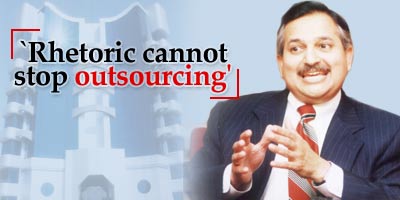 | « Back to article | Print this article |

Dilip R Vellodi, recipient of the Ernst & Young New York State Entrepreneur of the Year award and Rochester Institute of Technology's Herbert W VandenBrul Entrepreneurial Award, founded Sutherland Global Services of Rochester, New York, in 1986.
The company now boasts of a revenue of $150 million.
The global client base of Sutherland includes 36 marquee clients, mostly Fortune 1000 companies in the high-tech and telecom space. Some of its clients include AT&T, Xerox, Amazon, HP, Gateway, Intuit, and Dell.
Sutherland, which has a total of 13 delivery centres, (eight in the United States, one in Canada and four in India), set up its Indian operations in 2002 as a global business process outsourcing company.
Sutherland has about 6,500 employees, with over 3,200 of them working in India.
With Oak Investment Partners (a multi-stage venture investor) investing $30 million in equity funding in the company, Sutherland expects the number of employees to rise to 9,000 in the next 15 months. Vellodi also revealed to Shobha Warrier in an interview that the company plans to hire 2,500 more employees in India.
You launched Sutherland in 1986 as a regional start-up. It is now a global BPO company, and outsourcing from India started in the year 2002. Why did you decide on India?
Why India? We have been watching India for the last four years. Two years ago, to be precise, in January 2002, we felt the timing was right from the BPO perspective.
The first reason was, we felt that the communication infrastructure was robust enough to be able to handle what we needed to have on behalf of our clients without any interruption or failure. We have got to ensure that we are taking very good care of our clients, and we cannot afford to have any kind of breakdown in our communication infrastructure or in our data infrastructure that puts them in a bad spot. Two years back, that was a big concern for us.
Second, India has a tremendous pool of talent, an extremely intelligent and a highly motivated workforce.
Thirdly, it is the cost factor. As far as cost is concerned, it is the manpower that makes the difference and not the infrastructure.
Did India and its workforce come up to your expectations?
Let's not forget that I am originally from India. But I have never worked in India. So, working in India is a new experience for me.
 Our main concern was meshing our organisation in the US and the new one in India. The cultures and the management team should gel and work together. The way everything worked out was a little bit of a surprise because we had not anticipated such a smooth change-over.
Our main concern was meshing our organisation in the US and the new one in India. The cultures and the management team should gel and work together. The way everything worked out was a little bit of a surprise because we had not anticipated such a smooth change-over.
Now we have executives flying back and forth without any problem. They communicate with each other well as communication is absolutely essential in our kind of work.
I would say the workforce here has come up to our clients' expectations. They are on par with what you get in North America. But we felt there was a dearth for leadership skills at certain levels.
There is a lot of animosity against India in the US because of outsourcing. As some has a global outsourcing company, how do you react to this backlash?
I think you are absolutely right. BPO is an emotional issue out there. When you speak to the individual who might have been impacted, it is a very emotional issue. But if you look at it from the macro point of view, it is an economic reality that is taking place. It is something that is inevitable.
It makes economic sense for companies to outsource and go offshore. This way, companies are actually getting same value for a lot less.
So, after making investments in the US, you take the decision to offshore to increase your global competitiveness. What companies would do after that is reinvest back. This way, new jobs are created, maybe different kind of jobs, but that is really what globalisation is all about.
These countries clamour for globalisation, but when it affected them adversely, the tone changes. . .
Yes, you are right. What they say goes against the very tenets of globalisation, free trade and free market. But it is an election year in the US. There is a lot of political rhetoric that is going on.
Let's take the example of Sutherland itself. Offshoring helped our company to be more robust and we made our footprints globally. We became more competitive and it allowed us to reinvest and grow.
That outsourcing will help companies reinvest seems to have not reached the people there? Otherwise, there would not have been such uproar. . .
When it is an emotional argument, it is very, very difficult to take a look at the reality objectively. Yes, there will have to be a programme of re-training; re-educating and setting the right expectation levels of workers.
But outsourcing will be a continuing reality?
Outsourcing and offshoring are realities. The clock cannot be turned back. The train has left the station and it will not be going back. No amount of rhetoric will stop this.
Some US states have already banned outsourcing by government-run companies. How will this affect the other companies that engage in outsourcing?
Let's not forget that America happens to be a capitalist country. That is where capitalism was born. The government will not be able to control what commercial establishments do.
Ultimately, why do companies exist? They are not non-profit organisations; you have certain responsibilities to the stakeholders, customers and employees. Outsourcing and offshoring are some of the key components that allow companies to be competitive and that cannot be controlled by the state, certainly not in the United States.
It was reported that the chairman of the National Intelligence Council of the US said that 3 million jobs might come to India by 2015 and this is a potential security risk. What is the security risk in outsourcing?
I haven't read the statement. I think he may be talking about classified information, classified data, et cetera. Like I said earlier, if they want to have that done there, it is going to cost them more.
When the economy was boiling over, that was before September 11, a minimum of 3-4 jobs out of 10 were going a-begging. They were not being filled. That has changed. Now the talent has to come from countries like India and it's a balancing act. You know something, people over there are applying to Sutherland in India to work here.
You mean the flow of people from one country to another will take place soon. . .
That has got to take place. Isn't that what globalisation is all about? You are really breaking down geographic barriers, and it makes a lot of sense.
In what way will outsourcing affect the economic scene in the United States and India a few years from now?
As the economy improves over there (in the United States), there would be probably a little more of a letting up on the pricing pressure. People might be willing to pay a higher price over there but I don't believe there will be any substantial impact in terms of opportunities and growth in the foreseeable future as far as India is concerned.
From the Sutherland perspective, India is very much going to be the engine of growth. We are going to continue to grow in North America as well. The pace of growth in India will be much higher.
A report suggests that 70 per cent of the outsourcing jobs from the US will come to India, 20 per cent will go to the Philippines and 10 per cent to China. As a global BPO company, are you also looking at China?
We as a company will be looking at China in the future. In fact, we have looked at it but not so aggressively; but it's there on our radar screen. The fundamental challenge in China will be, the workforce that knows no English, while you have a workforce that speaks English here in
India. They are taking a concentrated effort now to master English. And China is a big market place.
Photos: Sreeram Selvaraj